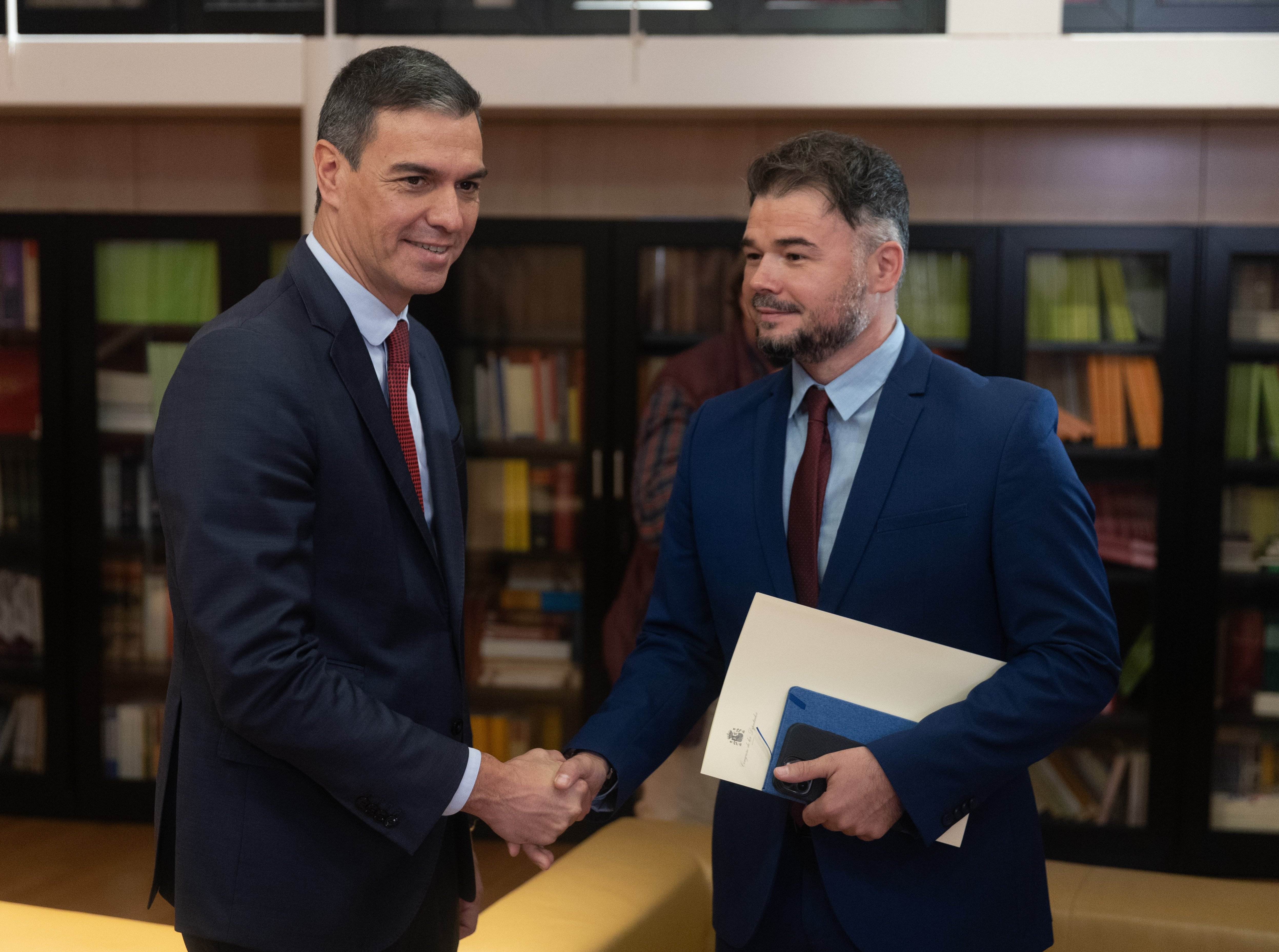Pedro Sánchez prepared the ground this Wednesday morning by calling the president of the Catalan Republican Left (ERC), Oriol Junqueras, a few hours before ERC's man in Madrid, Gabriel Rufián, met with the Socialist (PSOE) candidate for the investiture, as part of his round of contacts with the different parties to gather support. After the meeting at the Congress of Deputies, Rufián warned the PSOE that his intention is to reach a deal on an investiture, and not an accord for the legislature, even though this is what the Socialists aspire to. "ERC votes are hard to get and we will go one step at a time", warned Rufián, making it clear that the seven Republican deputies could be used to invest Pedro Sánchez, while, for example, the budget question will be part of "another round".
After the meeting, the Catalan MP, who did not want to set dates for the negotiations that have been underway "since election night", stressed that his conditions are "demanding" and "reasonable", at the same time that he highlighted that "they are not on behalf of the party", but rather "the country" - that is, Catalonia. At this point he stressed that the three essential and "equally important" points are the deployment of the amnesty law, the self-determination referendum and measures to alleviate the fiscal deficit and the transfer of Rodalies.
The meeting was held a few hours after Sánchez and Junqueras spoke on the phone, at the initiative of the acting PM, as ERC sources confirmed. In this regard, Rufián emphasized that it is part of "democratic normality" that "two very important positions" establish telephone contact. "The abnormal was what was happening in recent times", said the ERC spokesperson in Madrid, who emphasized that "today is a good day". Oriol Junqueras has been president of ERC since 2011, but remains banned from public office under the 2019 sentence from the Supreme Court for his part in the Catalan independence process. Asked about the possibility of the Socialist candidate also consulting by phone with Carles Puigdemont, Rufián assured that it would be "good" and "healthy" if they could talk.
In relation to the legal opinion presented on Tuesday night by Sumar regarding the amnesty, Rufián warned Yolanda Díaz that ERC "does not need intermediaries to talk to the PSOE". Despite calling it "good news" that Sumar is involved in "the resolution of the conflict", the Republican spokesperson notes that the left-wing platform's approach "sounds familiar" to him: "It is exactly the same as our 2021 proposal".
The preliminaries: Sánchez calls Junqueras
In the middle of the negotiations for the investiture, whose debate and vote are still without a date, Pedro Sánchez and Oriol Junqueras have had a telephone conversation, according to their parties. As explained by ERC, Junqueras used the call, which lasted for almost 40 minutes, to "convey" to Sánchez the "need to advance in the negotiation of the main demands that the Republicans have placed on the table".
On the other hand, according to PSOE sources, Sánchez thanked Junqueras for ERC's support during the past parlaimentary term in Congress, since the Catalan pro-independence party supported the coalition government's budgets, among other key legislation. Both sides underlined the "important political and social advances that have taken place" in the last three and a half years, from the partial pardons of the Catalan leaders (including Junqueres himself) and the reform of the Penal Code to the increases in the minimum wage and key laws such as abortion and euthanasia.
Canarian Coalition open to abstaining
Despite the fact that Junts' decision to vote either for or against the investiture - but under no circumstances abstaining - left the Canarian Coalition (CC) without influence in the game, the Canary Islands political party's only MP, Cristina Valido, opened herself this Wednesday to the possibility of abstaining after meeting with the acting PM, according to how the negotiations progress. "Our vote will not determine the next government, but it will be decisive during the legislature", said the only member of CC, who voted in favour of the election of Alberto Núñez Feijóo in September. The amnesty proposal makes it almost impossible to say 'yes', according to the CC, although they could consider abstention "if the Canary Islands' agenda and immigration issues are resolved", referring to the request to create a single command to manage the migration crisis experienced by the Canary Islands.
Tomorrow, Spanish holiday; Friday, Junts and Bildu
After today's meetings with ERC, the Canarian Coalition and the Navarra group UPN, Sánchez reserves Friday for his meetings with the Basque party EH Bildu and Together for Catalonia (Junts), the party with whom he is focusing the bulk of the negotiation. For now, the acting PM is trying to tie up a legislative pact that goes beyond the inauguration of his government, although the political parties involved admit that the real negotiation will start from next week.
In any case, Sánchez will first have to get through the pressure of the annual military parade for October 12th, Spain's National Day. In recent years, the Socialist leader has been booed loudly at the parade in Madrid and this year, with the amnesty under discussion, it would not be surprising if he was again jeered. In fact, the PSOE accuses the PP of "agitating the streets" against Sánchez and has called on the PP not to turn the so-called Día de la Hispanidad - the "Day of Spanishness" - into "the festival of the insult".

